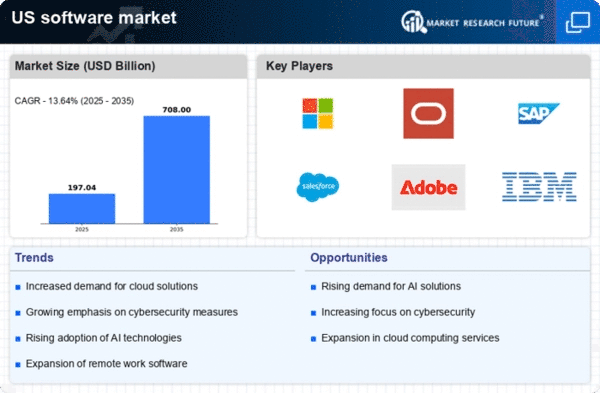Surge in Cloud Computing Adoption
The software market is experiencing a notable surge in cloud computing adoption, driven by the increasing demand for scalable and flexible solutions. Businesses are migrating to cloud-based platforms to enhance operational efficiency and reduce infrastructure costs. In 2025, it is estimated that cloud services will account for approximately 40% of total software market revenue in the US. This shift allows organizations to access advanced software applications without the need for extensive on-premises installations. Furthermore, the rise of remote work has accelerated this trend, as companies seek to provide employees with seamless access to software tools from various locations. As a result, cloud computing is likely to remain a pivotal driver in the software market, fostering innovation and enabling businesses to adapt to changing market dynamics.
Emphasis on Custom Software Solutions
The software market is increasingly emphasizing custom software solutions, as businesses seek tailored applications that meet their specific needs. Off-the-shelf software often fails to address unique operational challenges, prompting organizations to invest in bespoke solutions. In 2025, the custom software development segment is expected to grow by over 20%, driven by the demand for personalized software that enhances user experience and operational efficiency. This trend is particularly evident in industries such as healthcare and finance, where regulatory requirements and specialized processes necessitate customized applications. As a result, the software market is adapting to this demand, with developers focusing on creating flexible and scalable solutions that align with individual business objectives.
Expansion of Mobile Application Development
The software market is currently experiencing an expansion in mobile application development, driven by the increasing reliance on mobile devices for business and personal use. In 2025, it is anticipated that mobile applications will generate over $100 billion in revenue within the software market. This growth is fueled by the need for businesses to engage customers through mobile platforms, offering convenience and accessibility. As a result, software developers are focusing on creating innovative mobile applications that cater to diverse user needs. The rise of 5G technology is also expected to enhance mobile app performance, further propelling this trend. Consequently, the expansion of mobile application development is likely to be a key driver in the software market, shaping the future of digital interaction.
Growing Demand for Data Analytics Solutions
The software market is witnessing a growing demand for data analytics solutions, as organizations increasingly recognize the value of data-driven decision-making. In 2025, the analytics software segment is projected to grow by over 25%, reflecting a shift towards leveraging big data for competitive advantage. Companies are investing in advanced analytics tools to gain insights into customer behavior, operational efficiency, and market trends. This trend is particularly pronounced in sectors such as retail and finance, where data analytics can significantly enhance strategic planning and operational performance. The software market is thus evolving to meet this demand, with providers offering sophisticated analytics solutions that integrate seamlessly with existing systems, thereby driving growth and innovation.
Increased Investment in Software Automation
The software market is seeing increased investment in software automation, as businesses strive to enhance productivity and reduce operational costs. Automation tools are becoming essential for streamlining processes, minimizing human error, and improving efficiency. In 2025, it is projected that the automation software segment will grow by approximately 30%, reflecting a strong shift towards automated solutions across various industries. Companies are adopting robotic process automation (RPA) and other automated systems to optimize workflows and free up human resources for more strategic tasks. This trend indicates a significant transformation in how organizations operate, with the software market evolving to provide innovative automation solutions that meet the demands of modern businesses.

















